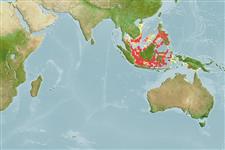Teleostei (teleosts) >
Eupercaria/misc (Various families in series Eupercaria) >
Labridae (Wrasses)
Etymology: Paracheilinus: Greek, para = the side of + Greek, chaite = hair + Greek, odous = teeth (Ref. 45335).
More on authors: Randall & Lubbock.
Environment: milieu / climate zone / depth range / distribution range
Ecology
Marine; reef-associated; depth range 10 - 40 m (Ref. 90102). Tropical
Western Central Pacific: Philippines. Also reported from Indonesia.
Size / Weight / Age
Maturity: Lm ? range ? - ? cm
Max length : 7.5 cm TL male/unsexed; (Ref. 48636)
Dorsal
spines
(total): 9;
Dorsal
soft rays
(total): 11;
Anal
spines: 3;
Anal
soft rays: 9;
Vertebrae: 25. Body and head orange; pale yellowish orange ventrally; head with 1-4 dark horizontal lines. Anterior dorsal rays not prolonged as filaments. Posterior soft portions of dorsal and anal fins angular. Predorsal scales 5. Lateral line interrupted (Ref. 2139). Seven violet to red stripes on body in life, the upper five extending full length of body; caudal fin of adult males emarginate (Ref. 41634).
Biology unknown (Ref. 9710). Inhabits coastal and offshore reefs, rubble areas and low-profile coral patches (Ref. 90102). Found in sheltered reefs with rich coral and algae mix along upper parts of slopes. Occurs in small groups of mix sexes but females outnumber males greatly (Ref. 48636). Males attract females by flashing neon-like colors an hour before sunset (true for most Paracheilinus (Ref. 90102).
Life cycle and mating behavior
Maturity | Reproduction | Spawning | Eggs | Fecundity | Larvae
Oviparous, distinct pairing during breeding (Ref. 205).
Randall, J.E. and R. Lubbock, 1981. Labrid fishes of the genus Paracheilinus, with descriptions of three new species from the Philippines. Jap. J. Ichthyol. 28(1):19-30. (Ref. 2139)
IUCN Red List Status (Ref. 130435)
Threat to humans
Harmless
Human uses
More information
ReferencesAquacultureAquaculture profileStrainsGeneticsElectrophoresesHeritabilityDiseasesProcessingNutrientsMass conversion
Tools
Special reports
Download XML
Internet sources
Estimates based on models
Preferred temperature (Ref.
123201): 28 - 29, mean 28.5 °C (based on 140 cells).
Phylogenetic diversity index (Ref.
82804): PD
50 = 0.5000 [Uniqueness, from 0.5 = low to 2.0 = high].
Bayesian length-weight: a=0.00955 (0.00456 - 0.02002), b=3.06 (2.89 - 3.23), in cm total length, based on LWR estimates for this (Sub)family-body shape (Ref.
93245).
Trophic level (Ref.
69278): 3.4 ±0.45 se; based on food items.
Resilience (Ref.
120179): High, minimum population doubling time less than 15 months (Preliminary K or Fecundity.).
Fishing Vulnerability (Ref.
59153): Low vulnerability (10 of 100).
